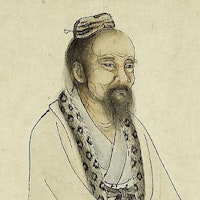What do I mean by harmonizing them with the Heavenly Equality? Right is not right; so is not so. If right were really right, it would differ so clearly from not right that there would be no need for argument…. Forget the years; forget distinctions. Leap into the boundless and make it your home!
What do I mean by harmonizing them with the Heavenly Equality? Right is not right; so is not so. If right were really right, it would differ so clearly from not right that there would be no need for argument…. Forget the years; forget distinctions. Leap into the boundless and make it your home!
Chuang Tzu

Harmonize Them
Topic: Interfaith Pathways
“Suppose you and I have had an argument. If you have beaten me instead of my beating you, then are you necessarily right and am I necessarily wrong? If I have beaten you instead of your beating me, then am I necessarily right and are you necessarily wrong? Is one of us right and the other wrong? Are both of us right or are both of us wrong? If you and I don’t know the answer, then other people are bound to be even more in the dark. Whom shall we get to decide what is right? Shall we get someone who agrees with you to decide? But if he already agrees with you, how can he decide fairly? Shall we get someone who agrees with me? But if he already agrees with me, how can he decide? Shall we get someone who disagrees with both of us?… But waiting for one shifting voice [to decide for] another is the same as waiting for none of them. Harmonize them all with the Heavenly Equality, leave them to their endless changes, and so live out your years. What do I mean by harmonizing them with the Heavenly Equality? Right is not right; so is not so. If right were really right, it would differ so clearly from not right that there would be no need for argument. If so were really so, it would differ so clearly from not so that there would be no need for argument. Forget the years; forget distinctions. Leap into the boundless and make it your home!“
Chuang Tzu, also known as Zhuang Zhou or Zhuangzi, was a luminous presence in an era of transformative thought. He lived around 350 BC, a time of remarkable intellectual ferment in China. As a Taoist philosopher, he embraced a worldview that emphasized balance, the rhythm of nature, and the pursuit of a deeply personal understanding of the universe. His teachings centered on the Tao, a profound concept that represented the underlying order and essence of the cosmos. Unraveling the mystery of the Tao was not about conquering or controlling it, but rather about aligning oneself with its fluid, natural ebb and flow.
Over the millennia, Chuang Tzu's wisdom has been distilled into a collection of sayings, passed down from generation to generation. These teachings, written with a depth and eloquence that resonates across the ages, offer a profound and transformative exploration of existence and our place within it. They invite us to question conventional wisdom, to see the world from different perspectives, and to embrace the inherent uncertainties of life. In their enchanting simplicity and their profound depth, Chuang Tzu's words hold a mirror to our deepest selves, asking us to reflect on who we are and how we relate to the world around us.
These timeless teachings of Chuang Tzu have found resonance far beyond the Taoist tradition. They have become one of the fundamental sources for Zen Buddhism, a spiritual path that shares Taoism's emphasis on mindfulness, simplicity, and the pursuit of enlightenment through direct experience. In this way, Chuang Tzu's legacy reaches across the centuries, touching lives and shaping philosophies far beyond the borders of his own time and place. His wisdom continues to illuminate the path for those seeking understanding, inviting us all to engage deeply with the mysteries of existence and our place within the cosmos.
Wilson, Andrew, editor. World Scripture - a Comparative Anthology of Sacred Texts. Paragon House, 1991, pp. 40-41 [Chuang Tzu 2].

Chuang Tzu
Resources
- Spirituality and Practice, The Way of Chuang Tzu by Chuang Tzu, Thomas Merton
- Socrates and Zhuangzi: The art of dialogue Nicolas Le Jeune
- A LOVELY DAY FOR A FRIENDSHIP: The Spiritual and Intellectual Relationship Between Thomas Merton and John Wu as Reflected in Their Correspondence John Wu, Jr.
- Merton & the Tao: Dialogues with John Wu and the Ancient Sages (The Fons Vitae Thomas Merton Series) Paperback – October 1, 2013
Copyright © 2017 – 2026 LuminaryQuotes.com About Us

The Way of Chuang Tzu by Thomas Merton
In A Note to the Reader Thomas Merton explains that his friend Dr. John Wu, Chinese scholar and Catholic mystic, was his “chief abettor and accomplice” in publishing The Way of Chuang Tzu.
“Both Merton and Wu were expert blenders of East and West. Merton is not given to “exoticism.” His engagement with the Chinese material is positive and optimistic but also possesses a sober utility for broadening and developing his own ideas. Wu saw in Merton a man who could appreciate Taoism, Confucianism, and Buddhism in much the same way as he did, as mutually complementing traditions. Within this triangulation of ideas, I think Taoism and “Chuang Tzu” spoke most directly to Merton’s heart as a “way” beyond words and abstractions to an existential “grasp of reality.” Confucianism and Buddhism offered essential support finding this “way,” but he maintained a special empathy with the Taoist mystic. I think Taoism was probably the locus for Merton’s ecumenical dialogue with Asian religion. He once referred to “Chuang Tzu” as a second autobiography. Most of Merton’s writing possesses an autobiographical quality; his life experiences are put onto the page. This categorization of the “Chuang Tzu” says much about Taoism in the life of Thomas Merton.”
— John C. Marshell Jr. [From an Amazon review about Merton & the Tao: Dialogues with John Wu and the Ancient Sages].
Thomas Merton and Chuang Tzu
The Catholic monk Thomas Merton had a special place in his heart for Chuang Tzu [Zhuangzi], the chief authentic spokesperson for Taoism, who lived in the fourth century B.C. The texts in this wonderful paperback are the result of a five-year study of this Chinese storyteller and mystic. Merton used four translations of Chuang Tzu into western languages to create his own readings. He finds in these anecdotes, poems, and meditations “a certain taste for simplicity, for humility, self-effacement, silence, and in general, a refusal to take seriously the aggressivity, the ambition, the push, and the self-importance which one must display in order to get along in society.”
“One may call this humility ‘cosmic,’ not only because it is rooted in the true nature of things, but also because it is full of life and awareness, responding with boundless vitality and joy to all living beings. It manifests itself everywhere by a Franciscan simplicity and connaturality with all living creatures. Half the ‘characters’ who are brought before us to speak the mind of Chuang Tzu are animals-birds, fishes, frogs, and so on. Chuang Tzu’s Taoism is nostalgic for the primordial climate of paradise in which there was no differentiation, in which man was utterly simple, unaware of himself, with Tao, and with all other creatures.”
–Frederic and Mary Ann Brussat, Book Review in Spirituality and Practice [Thomas Merton, The Way of Chuang Tzu (Shambhala, 03/04)].
Socrates and Zhuangzi: The art of dialogue, Nicolas Le Jeune [Excerpts]
“The art of the Socratic dialogue is described like this by Pierre Hadot: “In order for a dialogue to be established which … can lead the individual to give an account of himself and of his life, the person who talks with Socrates must submit, along with Socrates, to the demands of rational discourse, that is, to the demands of reason. In other words, caring for ourselves and questioning ourselves occurs only when our individuality is transcended and we rise to the level of universality, which is represented by the logos the two interlocutors have in common.” In the dialogue, both Socrates and his interlocutor exercise their rationality through the dialogue. It means that they transcend their individuality, they overcome their personal prejudice and opinion and rise to the level of the logos. This logos is this common discourse that emerges from the practice of dialogue. In the concrete practice of the Socratic dialogue, this common logos refers to the realization of an accord between opinions of different interlocutors. It does not consist of a particular preexistent set of propositions or theories but arises from the practice of the rational dialogue itself. In other words, the logos is something that emerges from the dia-logos.”
—Pierre Hadot [Philosophy as a Way of Life: Spiritual Exercises from Socrates to Foucault].
“…For Zhuangzi [Chuang Tzu] “the Sage does not proceed from any one of them alone but instead lets them all bask in the broad daylight of Heaven.” The sage allows the “this” and “that” to “bask in the broad daylight of Heaven”, meaning that he lets the debate, and the opinion of the participant, develop spontaneously and naturally without being stuck in one perspective. For him, the sage is “someone who really gets all the way through them, that can see how the two sides open into each other to form a oneness. Such a person would not define rightness in any one particular way but would instead entrust it to the everyday function [of each being]. Their everyday function is what works for them, and “working” just means this opening up into each other, their way of connecting. Opening to form a connection just means getting what you get: go as far as whatever you happen to get to and leave it at that. It is all just a matter of going by the rightness of the present “this.” To be doing this without knowing it, and not because you have defined it as right, is called “the Course.”
When the sage is debating, he does not stay attached to one side of the debate. On the contrary, he “gets all the way through” the different sides of the debate, so he understands how the different positions are generated by each other. Therefore, he understands how both parties of the debate are united by a dialectical process and rise to the level of the logos that emerge from the dialogos. Therefore, he “would not define rightness in any one particular way”, he will not be attached to a specific definition of “this” and “that. On the contrary, he would entrust rightness “to the everyday function [of each being],” in other words, he will go along the natural and spontaneous development of the debate, affirming “this” or “that” depending of “rightness of the present.” At one point, if we regularly repeat this exercise, we will “doing this without knowing it” and not because he has defined it as right. In other words, he will be wise not because he can define what is wisdom (which is impossible), but because he has developed through the practice of dialogue the virtuosity of his mind which allows him to be attuned with the logos or Dao (道).”
–Nicolas Le Jeune [Zhuangzi, Translated by Brook Ziporyn (Zhuangzi: The Essential Writings with Selections from Traditional Commentaries) p. 11].